
| WB | 咨询技术 | Human,Mouse,Rat |
| IF | 咨询技术 | Human,Mouse,Rat |
| IHC | 1/25-1/100 | Human,Mouse,Rat |
| ICC | 技术咨询 | Human,Mouse,Rat |
| FCM | 咨询技术 | Human,Mouse,Rat |
| Elisa | 1/2000-1/5000 | Human,Mouse,Rat |
| Aliases | H1; H1RLX; RLXH1; bA12D24.3.1; bA12D24.3.2 |
| Host/Isotype | Rabbit IgG |
| Antibody Type | Primary antibody |
| Storage | Store at 4°C short term. Aliquot and store at -20°C long term. Avoid freeze/thaw cycles. |
| Species Reactivity | Human |
| Immunogen | Fusion protein of human RLN1 |
| Formulation | Purified antibody in PBS with 0.05% sodium azide and 50% glycerol. |
+ +
以下是关于RLN1抗体的3篇参考文献示例(文献信息为虚构,仅供格式参考):
1. **文献名称**: *RLN1 Antibody-Based Detection of Relaxin-1 in Ovarian Cancer Tissues*
**作者**: Smith A, et al.
**摘要**: 该研究开发了一种高特异性RLN1单克隆抗体,用于检测卵巢癌组织中松弛素-1(RLN1)的过表达,证实其与肿瘤侵袭性和患者预后不良相关。
2. **文献名称**: *Role of RLN1 in Cardiac Fibrosis: Insights from Neutralizing Antibody Studies*
**作者**: Chen L, et al.
**摘要**: 通过使用RLN1中和抗体,研究发现抑制RLN1可显著减轻小鼠模型中心脏纤维化进程,提示RLN1可能成为抗纤维化治疗的潜在靶点。
3. **文献名称**: *Development of a Novel RLN1 ELISA Kit for Early Pregnancy Diagnosis*
**作者**: Gupta R, et al.
**摘要**: 该文献报道了一种基于RLN1多克隆抗体的ELISA检测方法,能够灵敏检测妊娠早期血清中的RLN1水平,为临床诊断提供新工具。
(注:以上文献为示例,实际引用请通过PubMed、Google Scholar等平台以关键词“RLN1 antibody”或“relaxin-1 antibody”检索近期研究。)
The RLN1 antibody is a key tool for studying relaxin-1 (RLN1), a peptide hormone belonging to the relaxin-insulin family. RLN1 is primarily known for its role in reproductive physiology, particularly in pregnancy, where it promotes uterine relaxation, cervical softening, and tissue remodeling. Beyond reproduction, RLN1 has broader biological functions, including anti-fibrotic, vasodilatory, and anti-inflammatory effects in cardiovascular, renal, and hepatic systems. It signals through the relaxin family peptide receptor 1 (RXFP1), activating pathways like cAMP and nitric oxide to modulate extracellular matrix turnover and cellular proliferation.
RLN1 antibodies are widely used in research to detect and quantify RLN1 expression in tissues and biofluids via techniques such as Western blotting, immunohistochemistry, and ELISA. These antibodies aid in exploring RLN1's involvement in pathological conditions, such as fibrosis, heart failure, and cancer, where dysregulated RLN1 expression may serve as a biomarker or therapeutic target. Commercial RLN1 antibodies are typically raised in rabbits or mice against synthetic peptides or recombinant human RLN1. with validation across species like human, rat, and mouse. Challenges include ensuring specificity due to homology within the relaxin family and optimizing detection in low-abundance samples. Recent studies also investigate recombinant RLN1 as a potential therapy, underscoring the antibody's relevance in both basic research and translational applications.
×